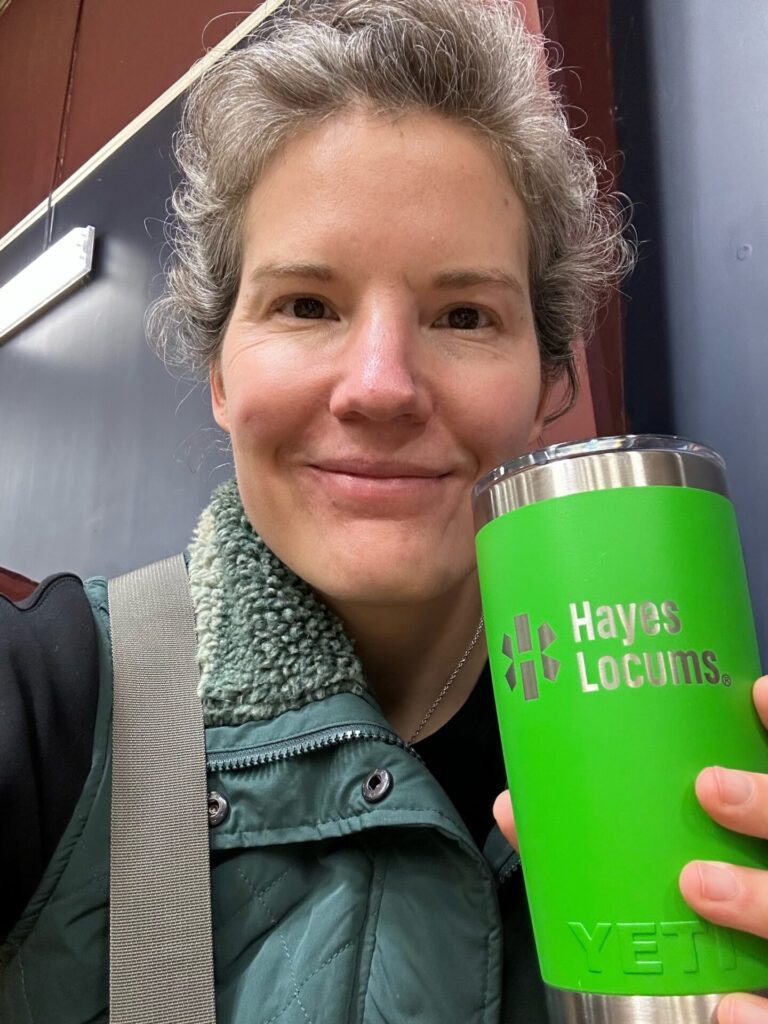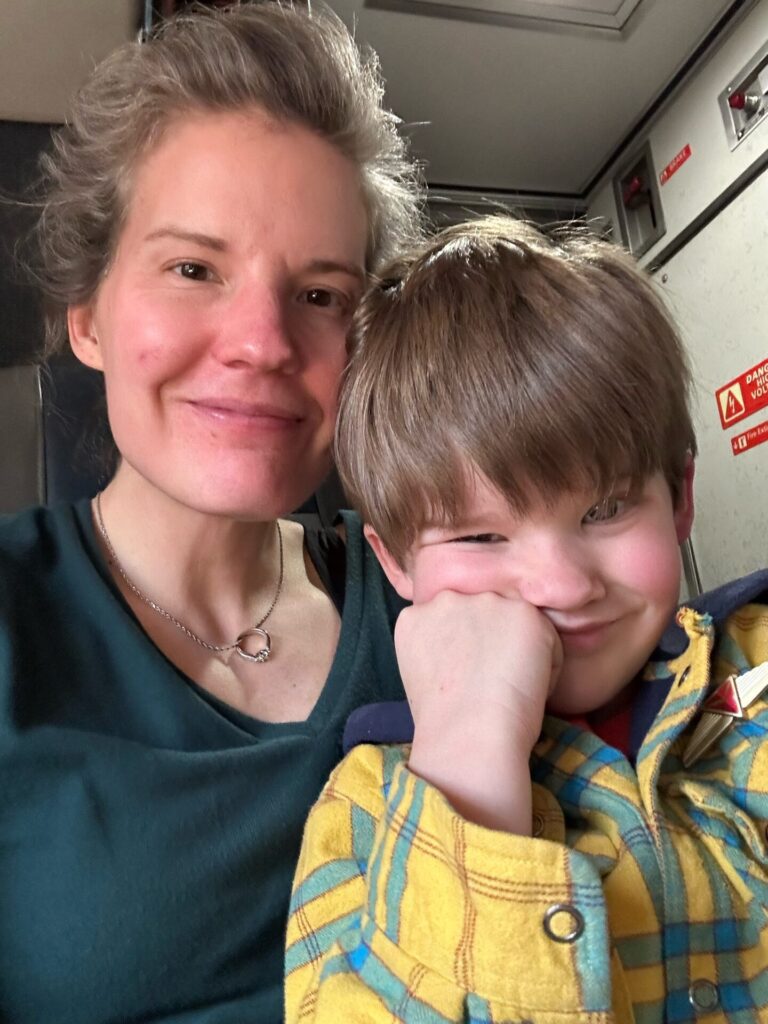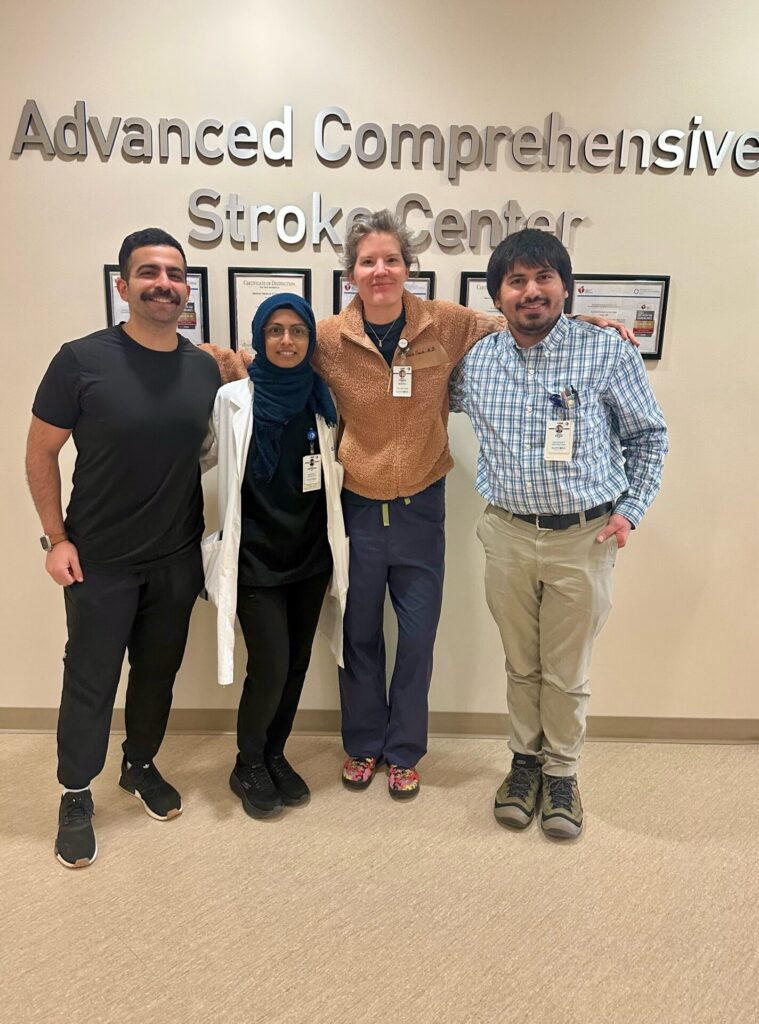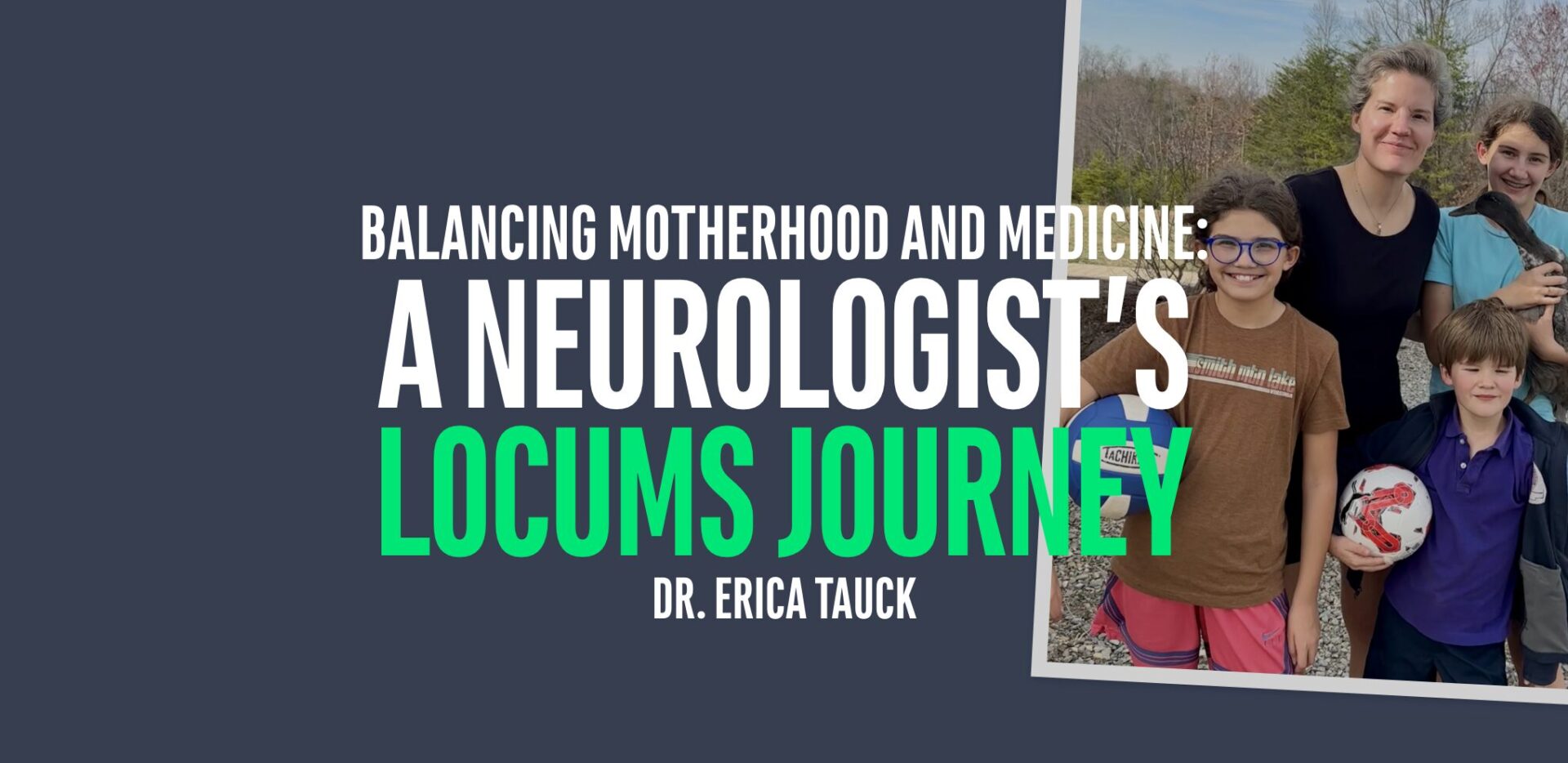As a hospital neurologist, Dr. Erica Tauck struggled with balancing her work and home lives. Through locum tenens, she discovered a career path that allows her to be fully present as both a mother and a physician.
What drew you to neurology?
I actually matched into a different specialty at first. During medical school, neurology was my least favorite block. My only exposure was two weeks in the headache clinic, and it was so boring I wanted to rip my thumbnails out [laughs].
When it came time to choose a residency, nothing really made me tick, so I chose based on quality of life and matched into physiatry, or physical medicine and rehabilitation. As part of my physiatry residency, I had a transitional year and was randomly assigned to inpatient neurology on my very first rotation. Two weeks into that rotation, I thought, Oh no. I really like this. It was fun, exciting, and just a great mix of things that really got me going.
Some of the attendings told me there was sometimes a mini-shuffle that happens with physicians who decided to switch residencies and offered to write me letters of support. But if you back out of your residency spot, there is no guarantee that you’ll get another spot—and if you don’t match with another residency, it will be a black mark on your resume. So it was a big leap of faith, but it worked out: I got three different offers, and I ended up at the University of Wisconsin, where I eventually became the chief resident.
The kicker to this story is that the place where I’m currently doing locums work is the same place where I did my transitional year when I decided to make the switch to neurology. So it all came full circle.
What drew you to explore locum tenens?

For many reasons, I felt that where I was working wasn’t going to be sustainable long term.
One of the neurologists that rotated through was a physician who also worked for Hayes Locums, and I made an offhand comment like, maybe I should just look at locums. He told me that if I was serious, he would connect me with his consultant, Tim Moses. Tim was already in the loop, he knew what was going on in the background, and he told me he had a great opportunity in Minnesota.
At the same time, a property came on the market 10 minutes from my parents’ house in Virginia. At the time we were living in Montana, but I realized that if I could take a job that doesn’t mandate where I live, we could live anywhere. So we bit the bullet and bought the house!
At the time, I thought that if locums crashed and burned, I would find something locally and make it work. But locums has been a dream, so we haven’t had to worry about that. I’ve had this lifelong dream to live in the country and see my kids running around outside, and now I have that.
What are the benefits of working as a locums neurologist versus having a traditional position at a hospital?
As a locum, I feel very free of the system.
I don’t have to worry about fixing administrative problems or attending high-level meetings, because I’m solely there to see patients. If there’s a problem in the system, I hope it’s a little bit better when I get back next time. But in the meantime, I get to just work around it to take care of my patients.

I was really surprised by how much I enjoy the actual physical separation between work and home.
When I had a traditional job, I felt like I was only half a doctor and half a mom. When I was home, I was always thinking about my patients, and when I was at work, I was thinking about what to make for dinner. I never felt vested in either one all the way.
People often say, “I can’t believe you’re willing to leave your kids.” But with locums, my typical schedule involves working 7-10 days per month, and then for the rest of the month, I can focus on being home. Not only do I get more days at home with my kids, the days I’m home I don’t have to worry about work at all. I’m a 100% all-in, stay-at-home mom. Then, when I leave for work, I don’t have to worry about the laundry. When I’m gone, my kids have to do some of the cooking and cleaning that I usually do on their own. But I get so much more appreciation when I come home because they truly understand and appreciate what a stay-at-home mom does. They get to see both sides.
I love being able to be 100% doctor and 100% mom. It’s so satisfying.
Do you have a memorable locums experience that stands out to you?
My physician-patient communication and interaction have been phenomenal compared to what it used to be.
One that stands out is an assignment I took in Minnesota when an epileptic patient in his 40’s came in seizing out of control. Once he was intubated and in the ICU, I learned that he had been newly diagnosed with terminal brain cancer. He didn’t speak any English, and his wife didn’t speak any English. They had 5 or 6 kids, and a big extended family living with them, and he was the sole provider.
It became rapidly clear that they didn’t understand the scope of his brain tumor. They were very clearly under the impression that we were going to fix him and that he was going to be able to walk out and go back to his job, and things would be fine.

Because I was in a position of light service, and nobody else had the time, I ended up spending an hour to two every day in his room, talking to this family through the interpreter, answering their questions, and trying to get them to understand the scope of the problem and think about the future.
I dreaded it every day, because I hate giving bad news, and I had to give bad news over and over again. Every day they had new questions, and with the interpreter, the process of answering them was slow.
On the fourth day, I told them I was rotating off his service. They all got very quiet, and then, an older woman, who was clearly the matriarch of the family, told me through an interpreter that she could tell that I had a very kind and giving spirit.
They all gave me big bear hugs, and we were all crying. Up until that point, I didn’t know if the time I had spent with them had made a difference, because I knew they were frustrated that we couldn’t just fix him. But in the end, they were so appreciative, and it had clearly meant a lot to them. It was a moment when I really loved medicine.
Have there been challenges with being a locums neurologist vs. a more traditional employment role?
Part of being a locum is you’re not as invested in the system, and you don’t necessarily know the team and the doctors and all the ins and outs as well. I do struggle with that sometimes.
But I have come up with a system, especially for the complicated patients that need a lot more investment. I help them come up with a list of things to keep track of, and further questions to ask to the incoming neurologist. That way, even if I’m not there, I feel better equipping them with what they should be looking for and asking going forward. It actually works very well.
It can also be a challenge working in locations that are more rural. I’m usually working at hospitals in places that aren’t necessarily rural themselves—but that serve rural populations who have to travel to get to them. Often the hospitals themselves are very up-to-date and modern, they just have a hard time plugging service holes because it’s such a rural area. I see my role as guaranteeing that the rural population has access to the full spectrum of providers.
As somebody who grew up in a similar area and currently has to travel to get to the big hospital system, I really appreciate being able to plug that hole. It’s really satisfying.
What advice do you have for other neurologists who may be considering locums?
I would recommend it to everyone, but I want to speak specifically to the moms in medicine.
Locums felt very off the table for me at first, because who wants to leave their family and be the “bad mom” who has to travel? But locums has been the exact opposite of what I expected it to be.
I have run into multiple friends and colleagues from medical school or residency who have kids and I’ve told them to try Hayes Locums. When you’ve been in the system and then you transition to locums and have the ability to actually focus on your patients, it makes medicine enjoyable.
You know, most of us got into medicine because we want to do something good for people. Getting to have those good patient interactions is extremely satisfying.
So I would specifically encourage moms to look into locums work and not be put off by the travel, because I think the vast majority of them would be surprised by how that separation between your work-life balance can make both work and life so much better.



